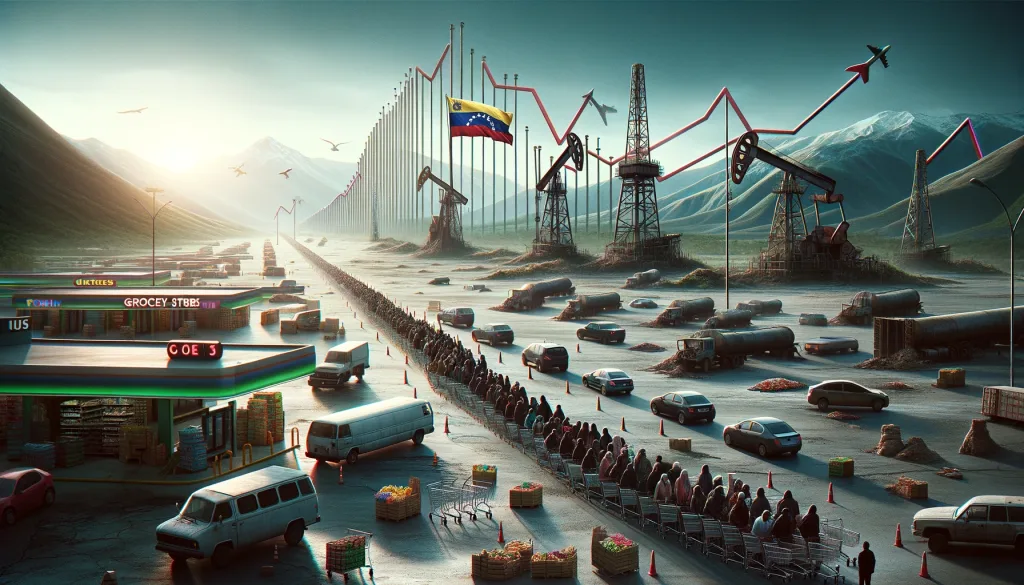Understanding Venezuela’s Dependence on Petroleum Exports
Deeply woven into the socio-economic fabric of Venezuela is the country’s considerable reliance on petroleum exports. For more than a century, black gold has served as the pivotal centerpiece of the nation’s economy, fuelling wealth, shaping policy decisions and creating a unique national identity centered around oil extraction as a basis of prosperity. Described often as a ‘rentier state’, Venezuela’s enduring conviction has been that the abundance of this one commodity will carry the nation forward towards unparalleled economic progress.
Yet, the reality in more recent years reveals another side of the story. With over 90% dependency on oil exports for its revenue, the country has chanced its economic health on the whims of global petroleum prices. When prices thrived, so did Venezuela. In contrast, a downturn in oil prices triggers a harsh and immediate impact on Venezuela’s stable economy. Therefore, the country’s financial health lies largely at the mercy of international market dynamics, perpetuating a cycle of vulnerability and instability.
Historical Overview of Venezuela’s Petroleum-centric Economy
Venezuela’s petroleum-centric economy can be traced back to the early 20th century, with the discovery of large oil reserves beneath its soil. The country quickly became one of the leading oil exporters in the world. The enormous revenues garnered from oil exports began to dominate the country’s economy, creepingly transforming it into a classic example of a ‘petro-state.’ By the mid-20th century, oil wealth had profoundly altered Venezuela’s socio-economic landscape, leading to rapid urbanization, significant increases in public spending, and remarkable improvements in social indicators such as literacy rates and life expectancy.
However, the country’s over-reliance on this single resource also made its economy extremely vulnerable to global petroleum market fluctuations. While successful oil industry nationalization in the 1970s initially spurred an economic boom, it also further entrenched Venezuela’s dependence on oil revenues. By the 1980s, a downturn in global oil prices had plunged Venezuela into a profound economic crisis, revealing the precariousness of an excessive reliance on petroleum exports for maintaining economic stability and growth. This marked the beginning of a roller-coaster ride for the Venezuelan economy, continually whipsawed by the volatile dynamics of global oil markets.
The Boom Years: Impact of High Petroleum Prices on Venezuela’s Economy

The rise in global petroleum prices in the early years of the 21st century significantly boosted Venezuela’s petroleum-dependent economy. An abundance of oil underpinned the country’s financial success, with petroleum exports accounting for over 90 percent of its total export revenues. This oil wealth was used to support social welfare programs, increase public spending, and maintain political stability. The unprecedented economic growth led to Venezuela becoming one of the richest countries in Latin America, basking in a golden era of prosperity and affluence.
However, this period of economic boom was not without its vulnerabilities. As Venezuela reaped the benefits of high petroleum prices, its economy also became dangerously linked to the fluctuations in the global oil market. Meanwhile, crucial non-oil sectors of the economy such as agriculture and manufacturing were overlooked, compounded by a reliability on oil revenue that elevated national spending. Consequently, aspects such as diversification, sustainable growth and economic resilience were pushed into the background.
- The boom years, marked by high petroleum prices, significantly bolstered Venezuela’s economy. A vast oil reserve served as the backbone of its financial prosperity.
- Petroleum exports constituted more than 90% of Venezuela’s total export revenues, highlighting the country’s heavy dependence on this single resource.
- This wealth was channelled into social welfare programs and public spending initiatives to maintain political stability and enhance the quality of life for citizens.
- As a result of these factors, Venezuela experienced unprecedented economic growth during this period. It emerged as one of Latin America’s wealthiest nations, enjoying a golden era characterized by prosperity and affluence.
However,
- Despite these apparent advantages, the economic boom also exposed certain vulnerabilities in Venezuela’s economy.
- While benefiting from high petroleum prices, Venezuela’s economy became perilously tethered to global oil market fluctuations. This over-reliance created an unstable economic environment that could easily be disrupted by changes in international oil prices.
- Critical non-oil sectors such as agriculture and manufacturing were neglected during this period. Over-dependence on oil revenue resulted in elevated national spending at the cost of diverse industrial development.
- • Consequently, important aspects like diversification within industries, sustainable growth strategies and building economic resilience were overlooked or pushed aside during this time frame. These oversights would later contribute to significant challenges when global conditions changed or when internal issues arose within their primary industry – petroleum production.
Linking Petroleum Dependence and Economic Instability in Venezuela

Venezuela, the country with the world’s largest proven oil reserves, has built an economy that heavily leans on petroleum revenues. This petroleum-dependency has subjected the nation to a rollercoaster of economic volatility. Years with high oil prices have fuelled extraordinary economic prosperity, however, when oil prices decrease, the nation’s economy tends to follow suit. The country’s dependency on a single commodity amplifies the impact of global economic shifts and invites fiscal instability.
Price volatility is a primary downside to dependency on a single resource, like oil. For countries like Venezuela, global oil price fluctuations can have far-reaching implications and represent a significant risk. Low oil prices reduce the state’s revenue, increase budget deficits, and lead to economic contraction. This over-reliance on oil subsequently creates a fragile economic system, vulnerable to potential price shocks in the international market. It evidently becomes a catalyst for economic instability.
The Downside of Over-reliance on a Single Resource: Case Study of Venezuela
Venezuela, blessed with the world’s largest crude oil reserves, has been economically dependent on petroleum exports for decades. On the surface, this blessing seems magnanimous, catapulting the once buoyant nation into the leading ranks of oil-exporting countries. Historically, its economy thrived during periods of high petroleum prices, with rampant revenues that allowed for significant public spending and social welfare programs. Beneath this facade, however, lay a perilous state of affairs—the peril of over-reliance on a single resource for national income and economic stability.
The economic crisis that engulfed Venezuela post the petroleum price collapse in 2014 highlighted the precarious state of its petroleum-centric economy. Socio-economic hardships like hyper-inflation, shortage of essential commodities, and plummeting living standards ensued as oil revenues shrank, and the nation’s economy found itself gasping for breath. Furthermore, the heavy dependence on petroleum had deterred the development and growth of other sectors, leaving Venezuela with little to fall back upon when petroleum prices descended. This over-reliance drew a stark reminder of the country’s unsustainable economic model and the need for diversification. Today, Venezuela stands as a case study of the economic perils of a poorly diversified economy mired by over-reliance on a single resource.
Decoding the Impact of Falling Petroleum Prices on Venezuela’s Economic Health
The steep decline in global petroleum prices presented a challenge of exceptional magnitude for Venezuela’s petroleum-centric economy. High petroleum prices had, over time, submerged the country into a state of extreme dependence. This dependence was largely unchecked and unbalanced by diversification into other economic sectors. Hence, as petroleum prices began to plummet, the impact was tantamount to a severe shock to the national economy, shaking the very foundations of Venezuela’s economic health.
Consequences of this petroleum price drop were felt across the nation, permeating all realms of everyday life. Critical sectors, including healthcare, food, and education, began to falter as a result of the instability induced by the fall in petroleum prices. Workers were laid off en masse, unemployment skyrocketed, and inflation soared to unprecedented levels, pushing the country deeper into a spiraling economic crisis from which recovery seemed increasingly bleak. The social fabric of the nation was equally disrupted as poverty rates surged alarmingly and the living standards of the Venezuelan people fell drastically.
Venezuela’s Economic Crisis Post the Petroleum Price Collapse

The sharp drop in global oil prices in 2014 triggered an economic crisis in Venezuela, which was heavily reliant on petroleum exports for its fiscal health. With the oil industry making up 25% of the total GDP and contributing to around 50% of the government’s revenue, the falling petroleum prices dealt a massive blow to the Venezuelan economy. The nation’s heavy dependence on a single resource for its macroeconomic stability became more apparent than ever, leading to a surge in inflation rates, shortage of essential goods and a steep decline in the living standards of the population.
This economic downturn was compounded by existing policy missteps, including overborrowing during the booming period and a lack of adequate economic diversification. The government’s failure to set aside enough savings during the oil boom of the 2000s for a possible future downturn left it ill-prepared to handle the crisis. Unable to procure essential commodities due to massive import cuts, Venezuela spiraled into a humanitarian crisis with soaring poverty rates, emerging food and healthcare crises, and escalating political instability. The petroleum price collapse of 2014, therefore, marked the initiation of an ongoing economic crisis in Venezuela, and it continues to grapple with the severe consequences to date.
Policy Missteps and the Effects of Petroleum Price Fluctuations in Venezuela
When petroleum prices were favorable, the Venezuelan government embraced a fierce level of dependence on oil exports. This over-reliance on a single commodity was fraught with potential risks and policy mistakes magnified the nation’s vulnerability. Fiscal mismanagement and imprudent economic policies intertwined with its flourishing petroleum sector caused a drastic surge in public expenditures. Boasting high oil revenues, Venezuela also witnessed extensive borrowing to fund its spending spree, fostering an environment of fiscal profligacy.
However, the landscape drastically shifted when petroleum prices experienced an unprecedented slump worldwide. The heavy reliance on oil revenues for public spending left the country utterly unprepared to cope with the resultant economic challenges. Debilitating inflation rates and a steep devaluation of the Venezuelan Bolivar ensued in the wake of these petroleum price drops. Economic instability became a haunting reality for Venezuelans, as the petroleum-centric approach coupled with policy missteps spelled disaster for the once oil-rich nation.
Exploring Alternatives: Diversifying Venezuela’s Economy Beyond Petroleum
Diversifying an economy that’s been intrinsically bound to a single resource is challenging. Nonetheless, for Venezuela, it’s a crucial step towards achieving economic stability in a world where petroleum prices are volatile and the resource itself eventually depletable. Experts propose that Venezuela could leverage its other natural resources like gold, iron ore, and bauxite to decrease its dependence on petroleum. Additionally, the country has vast unused arable land that it could exploit for large-scale agricultural production.
Apart from these natural resources-based alternatives, the digitization wave presents another promising avenue for diversification. Venezuela could harness its comparatively young population to develop a thriving tech industry, similar to the systems established by countries such as India and the Philippines. Indeed, sectors such as fintech and cleantech offer fertile ground for new business opportunities, thus offering revenues outside of the oil industry. However, such transformation involves investing in human capital development through quality education and training, robust digital infrastructure, and a regulatory environment that supports tech innovation.
Lessons Learned from Venezuela’s Economic Crisis: Dependence on Petroleum as a Cautionary Tale

Historically, Venezuela’s economic prosperity has been closely tied to the health of the petroleum industry. As the country with the world’s largest proven oil reserves, it’s perhaps unsurprising that at its peak, oil revenues accounted for over 90% of the country’s export earnings, providing a significant cushion for social and infrastructural programs. However, the lack of economic diversity has left the country significantly exposed to the volatility of global oil markets.
The perfect storm of falling oil prices and economic mismanagement have led to an unprecedented crisis in Venezuela. The resultant hyperinflation, severe food and medicine shortages, and emigration of millions of desperate citizens paint a grim picture of a nation in distress. The case of Venezuela serves as a stark reminder of the dangers of excessive reliance on a single commodity for sustenance, providing valuable lessons on environmental sustainability, economic volatility, and the necessity of diversification for countries worldwide dependent on fossil fuels.
What has been Venezuela’s dependence on petroleum exports?
Venezuela’s economy has been heavily dependent on petroleum exports, accounting for over 90% of the country’s export earnings and more than half of the government’s revenue.
Can you provide a historical overview of Venezuela’s petroleum-centric economy?
Venezuela has a long history of petroleum production, dating back to the early 20th century when oil was first discovered in the country. The petroleum industry rapidly became the cornerstone of the Venezuelan economy, leading to significant economic growth and prosperity during periods of high oil prices.
How did the high petroleum prices impact Venezuela’s economy during the boom years?
During the boom years, high petroleum prices led to significant economic growth in Venezuela. The government used the revenue from petroleum exports to fund various social programs, leading to improvements in poverty rates, literacy, and overall living standards.
How does petroleum dependence link to economic instability in Venezuela?
The heavy dependence on petroleum has made Venezuela’s economy highly susceptible to fluctuations in global oil prices. When prices are high, the economy booms, but when they fall, the country experiences significant economic instability.
What is the downside of over-reliance on a single resource as observed in Venezuela’s case?
The downside of over-reliance on a single resource, as in the case of Venezuela, is that it leaves the economy vulnerable to fluctuations in the price of that resource. This has resulted in periods of economic instability and crisis in Venezuela when oil prices have fallen.
How did falling petroleum prices impact Venezuela’s economic health?
Falling petroleum prices have had a devastating impact on Venezuela’s economy, leading to hyperinflation, a drastic decrease in government revenue, and severe shortages of basic goods and services.
What was the state of Venezuela’s economic crisis post the petroleum price collapse?
Following the collapse of petroleum prices, Venezuela’s economic crisis worsened, with hyperinflation, shortages of basic goods, and a significant contraction of the economy. The country also faced a humanitarian crisis, with many Venezuelans leaving the country due to the economic conditions.
How did policy missteps and the effects of petroleum price fluctuations affect Venezuela?
Misguided economic policies and the effects of petroleum price fluctuations have exacerbated Venezuela’s economic crisis. The government’s inability to diversify the economy away from petroleum and its failure to save during the boom years have made the country particularly vulnerable to falling oil prices.
What are some alternatives for diversifying Venezuela’s economy beyond petroleum?
Diversifying Venezuela’s economy beyond petroleum could involve developing other sectors such as agriculture, manufacturing, and services. This would reduce the country’s dependence on a single resource and make the economy more resilient to global market fluctuations.
What lessons can be learned from Venezuela’s economic crisis and its dependence on petroleum?
The main lesson from Venezuela’s economic crisis is the risks associated with over-reliance on a single resource. It serves as a cautionary tale about the importance of economic diversification and sound fiscal policies in order to ensure long-term economic stability and prosperity.

